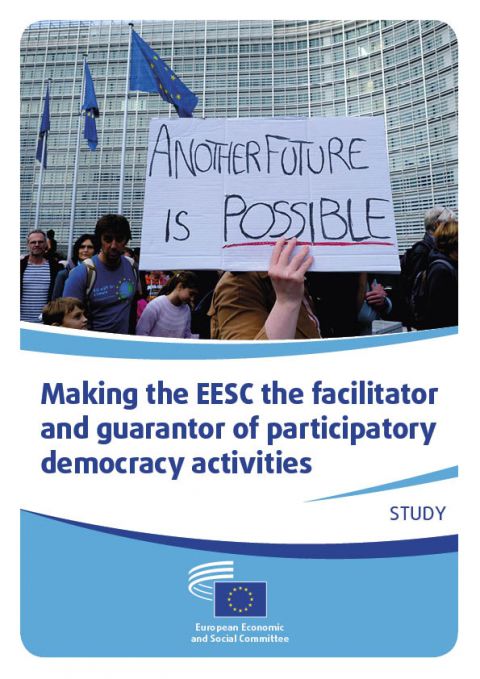 Homepage CASE
Homepage CASE
Selected values

Making the EESC the facilitator and guarantor of participatory democracy activities
-

Karolina Zubel
Environment, Energy and Climate Change Director
Karolina Zubel holds an MSc from the London School of Economics and Political Science and BA from the University of Warsaw and Sciences Po Paris. Currently, she is a PhD student at the Warsaw School of Economics, focusing her research endeavours on smart cities developments. Her work has been at the intersection of sustainability, low-carbon … <a href="https://case.dev10.pro/publications/making-the-eesc-the-facilitator-and-guarantor-of-participatory-democracy-activities/">Continued</a>
Articles from this author:
-
Affordable Sustainable Housing in the EU
The study commissioned by the European Economic and Social Committee, examines strategies to address the pressing challenges of housing affordability and sustainability across the EU. It focuses on two key areas: the role of digitalization in the housing sector and the contribution of social economy initiatives. Key findings include: Digitalization's Role: The study highlights how tools like Building Information Modelling (BIM) and AI can streamline planning, improve energy efficiency, and enhance building management. Case studies from Denmark, France, and the Netherlands illustrate successful digital solutions. Social Economy Contributions: Localized, community-oriented housing solutions, like cooperatives and social rental agencies, demonstrate the value of non-profit initiatives in creating affordable, resilient, and sustainable living environments. Examples include projects in Austria, Poland, and Spain. Policy Recommendations: Medium-term goals (by 2030) include harmonizing EU-wide housing policies and integrating digital platforms. Long-term strategies (by 2050) emphasize developing inclusive housing models and leveraging digital innovations. The study concludes that addressing housing issues requires a holistic approach, combining economic, environmental, and social strategies while fostering cooperation among local, national, and EU stakeholders.
-
The means for cities and regions to support the energy transition in the Mediterranean
The Mediterranean region is warming 20% faster than the global average, and population growth, tourism, and industrialisation are increasing pressure on its energy resources, which remain heavily reliant on fossil fuels. Despite vast renewable energy potential, Southern and Eastern Mediterranean countries use only a small share of RES. Decarbonisation is essential to addressing the climate crisis and promoting sustainable growth. Local and regional authorities (LRAs) are key to accelerating an inclusive energy transition. Recommended actions include: - Developing tailored energy transition plans aligned with national and international goals. - Investing in capacity-building and training for local energy management. - Expanding beyond solar energy to include wind, bioenergy, and offshore renewables. - Collaborating across networks to share expertise and promote decentralised solutions. - Engaging communities through awareness campaigns and participatory decision-making. - Offering incentives to attract private investment and streamline processes. - Fostering international cooperation to share resources and innovation. By empowering local actors and promoting collaboration, the Mediterranean can lead a just and sustainable energy transition.
-
Natural disasters: anticipatory governance and disaster risk management from a local and regional perspective
Climate change poses a significant challenge across the European Union, with increasing climate-induced hazards threatening ecosystems, economies, and public well-being. Local and Regional Authorities (LRAs) play a crucial role in addressing these risks due to their close connection to affected communities. Effective Climate Change Adaptation (CCA) strategies must be tailored to local needs, yet many regions face challenges like limited resources and expertise. Proactive crisis management, integrated with Disaster Risk Management (DRM), is essential to prevent future crises. By using strategic foresight tools, LRAs can better prepare for risks, allocate resources effectively, and build community resilience. However, challenges remain, including financial constraints, trust issues and ensuring equity for vulnerable groups. To overcome these obstacles, LRAs should focus on inclusive governance, citizen engagement, and data-driven decision-making. As climate hazards intensify, integrating CCA with DRM at the local level will better equip communities to withstand and recover from climate impacts. Collaborative efforts and capacity-building are key to a resilient future.
-
Affordable Sustainable Housing in the EU
-

Agnieszka Kulesa
Specialist in Social Sciences
Agnieszka Kulesa has been working at CASE since 2018. She specialises in the labour market, international labour migration, and migration policies within and outside the European Union.
Articles from this author:
-
Exploring the Entrepreneurial Potential of Belarusian Migrants in the EU
This Working Paper aims to deepen the understanding of Belarusian migration to the EU, with a particular focus on entrepreneurship among Belarusian migrants.
-
Intergenerational Dialogue for the Future of My City
The publication is an educator's guidebook designed to inspire and support discussions between youth and elderly participants about shaping the future of urban environments. Created as part of the "Future for All" project by CASE (Center for Social and Economic Research), this guidebook uses Warsaw as a case study but provides adaptable insights for cities globally. It is funded by the European Economic Area and Norwegian Financial Mechanism (2014–2021). The guidebook delves into critical themes, including: Demography: Addressing the implications of an ageing population, declining birth rates, and migration patterns for urban planning and social cohesion. Migration: Exploring the integration of diverse populations and fostering intercultural and intergenerational understanding. Climate Change: Highlighting urban sustainability through public initiatives like green spaces and waste reduction. Digitalisation: Emphasizing smart city development while bridging the generational digital divide. Central to its approach are intergenerational activities that foster collaboration and mutual understanding, with a focus on scenario planning, problem-solving, and community engagement. This resource equips educators with tools to promote critical thinking and inclusivity, encouraging young and older citizens alike to actively shape resilient and sustainable urban communities.
- Poland’s Migration Strategy for 2025-2030 – Expert Commentary
-
Exploring the Entrepreneurial Potential of Belarusian Migrants in the EU
-

Jan Bazyli Klakla
Dr. Jan Bazyli Klakla holds doctorates in law and sociology from the Jagiellonian University in Krakow, where he also completed studies in law, sociology, and cultural studies, alongside postgraduate studies in international migration at the University of Warsaw. He is currently a Director of Migration, Social Policy, and Development Cooperation at CASE – Center for Social and Economic Research in Warsaw, and a post-doctoral researcher at the Center for Legal Education and Social Theory at the University of Wrocław. Dr. Klakla has been involved in and has led numerous national and European research projects, including those funded by Horizon Europe, Norway Grants, and Polish National Science Center. His work also includes providing consulting and expert services to key European institutions such as the Committee of the Regions, the European Economic and Social Committee, and CEDEFOP (European Centre for the Development of Vocational Training). He has served as an expert in the “Safe Krakow - Security Strategy for Krakow” program. Dr. Klakla is the editor of Law and Culture. Reconceptualization and Case Studies (Springer Nature, 2021) and the author of Law and Acculturation. Conceptualisation and Empirical Case Study: Slavic Migrants in Poland (Palgrave Macmillan, 2024) and Studying in Times of Crisis. Acculturation and Adaptation of Ukrainian Students at Kraków Higher Education Institutions amidst the COVID-19 Pandemic and Russia's Aggression against Ukraine (Brill, 2025). In recognition of his scholarly contributions, he was awarded first prize in the competition of the Association of the Philosophy of Law and Social Philosophy (IVR) – Polish Section for the best doctoral dissertation in the theory and philosophy of law. His research interests span migration, sociology of law, educational research, public policy analysis, customary law, and the methodology of social sciences.
Articles from this author:
-
Blueprint and Methodology for Innovative Governance
The publication is a key deliverable within the BioBeo project, funded under the Horizon Europe program. It provides a structured approach to integrating bioeconomy education into school curricula across different institutional and social environments. The report examines the actors involved in curriculum decision-making, from policymakers and school administrators to parents, students, and businesses. It categorizes existing procedures for introducing new content into schools, whether initiated by teachers, school heads, or government authorities. Key barriers—legal, organizational, and socio-cultural—are identified, along with strategies to overcome them. A central theme is the importance of inclusive governance in education, advocating for participatory decision-making that involves various stakeholders. Recommendations highlight the need for flexibility in curriculum design, adequate funding, professional support for teachers, and depoliticization of educational content. The report concludes by situating these findings within the broader BioBeo curriculum framework, reinforcing the role of education in fostering a sustainable and circular bioeconomy.
- Poland’s Migration Strategy for 2025-2030 – Expert Commentary
-
178th mBank-CASE Seminar Proceedings: Immigration and the Labour Market in Poland
Over the last dozen years Poland became an immigration country. The 178th mBank-CASE Seminar proceedings is devoted to this process - from various perspectives. The data speak for themselves. Immigration provides significant support for the Polish labour market. Poland is facing a rapid population decline. According to projections by the Ministry of Finance in 2022, by 2030 the population of Poland could decrease from the current 37.75 million to 36.6 million, and by 2050 to 34.1 million. The percentage of people of working age will decrease, while the elderly population will increase. Immigration may provide a solution to this problem. In 2022, around 100,000 people from Belarus arrived in Poland, most of them actively participating in the labour market. In addition, there are 1.2 million Ukrainians who stayed in Poland after Russia's invasion of Ukraine. It is therefore necessary to develop a long-term immigration, education and social policy to retain immigrants and integrate them into society and the labour market. This is what eminent experts who have been researching migration processes for years write about in the first two chapters of these Notebooks: Dr Maciej Duszczyk, as well as Dr Agata Górny and Dr Paweł Kaczmarczyk, from the Centre for Migration Research, operating within the University of Warsaw. The third chapter is devoted to the situation of female domestic workers. Table of Contents Ewa Balcerowicz - Introduction p. 5-6 Maciej Duszczyk - Chapter 1: Factors and conditions in Poland’s transformation into an immigration country p. 7-14 Agata Górny, Paweł Kaczmarczyk - Chapter 2: Immigrants and war refugees from Ukraine on the Polish labour market: opportunities and challenges p. 15-33 Jan Bazyli Klakla - Chapter 3: In the Shadows. Ukrainian Domestic Workers in Poland p. 34-44
-
Blueprint and Methodology for Innovative Governance
-

Delia Agostinelli
Economist
Delia Agostinelli is a Junior Economist at CASE. Graduated cum laude in Economics and Economic Policy at the University of Bologna with a thesis entitled “Impact of skilled migration on human capital formation and growth performance of source countries“. At CASE, Delia is involved in projects related to green economy, energy policies as well as … <a href="https://case.dev10.pro/publications/making-the-eesc-the-facilitator-and-guarantor-of-participatory-democracy-activities/">Continued</a>
Articles from this author:
- How to eradicate skills poverty among the most vulnerable?
-
E-services for citizens at local and regional level in EaP countries
This study was prepared as part of a project on E-services for citizens at local and regional level in EaP countries commissioned by the European Committee of the Regions (CoR) under the specific contract No CDR.17081 implementing multiple framework contract for studies in the field of external relations No CDR/2022/B3/1/1-CIVEX-RELEX. The aim of the study … Continued
-
Addressing the challenges of the smart, sustainable and inclusive growth in national Recovery and Resilience Plans: a preliminary assessment
This briefing paper provides an initial analysis of selected measures proposed by Germany, France, Italy and Poland in their respective Recovery and Resilience Plans (RRPs), and focuses on the areas of competitiveness, business environment /entrepreneurship, and (re)industrialisation. As the analysis has shown, targets and milestones set for the majority of the analysed measures seem to … Continued
Related publications
Thanks for joining us!
You're now part of a community that values [your newsletter's focus]. Get ready to stay informed, inspired, and engaged with our carefully curated content.
